Campus LiveGreen events highlight sustainability month
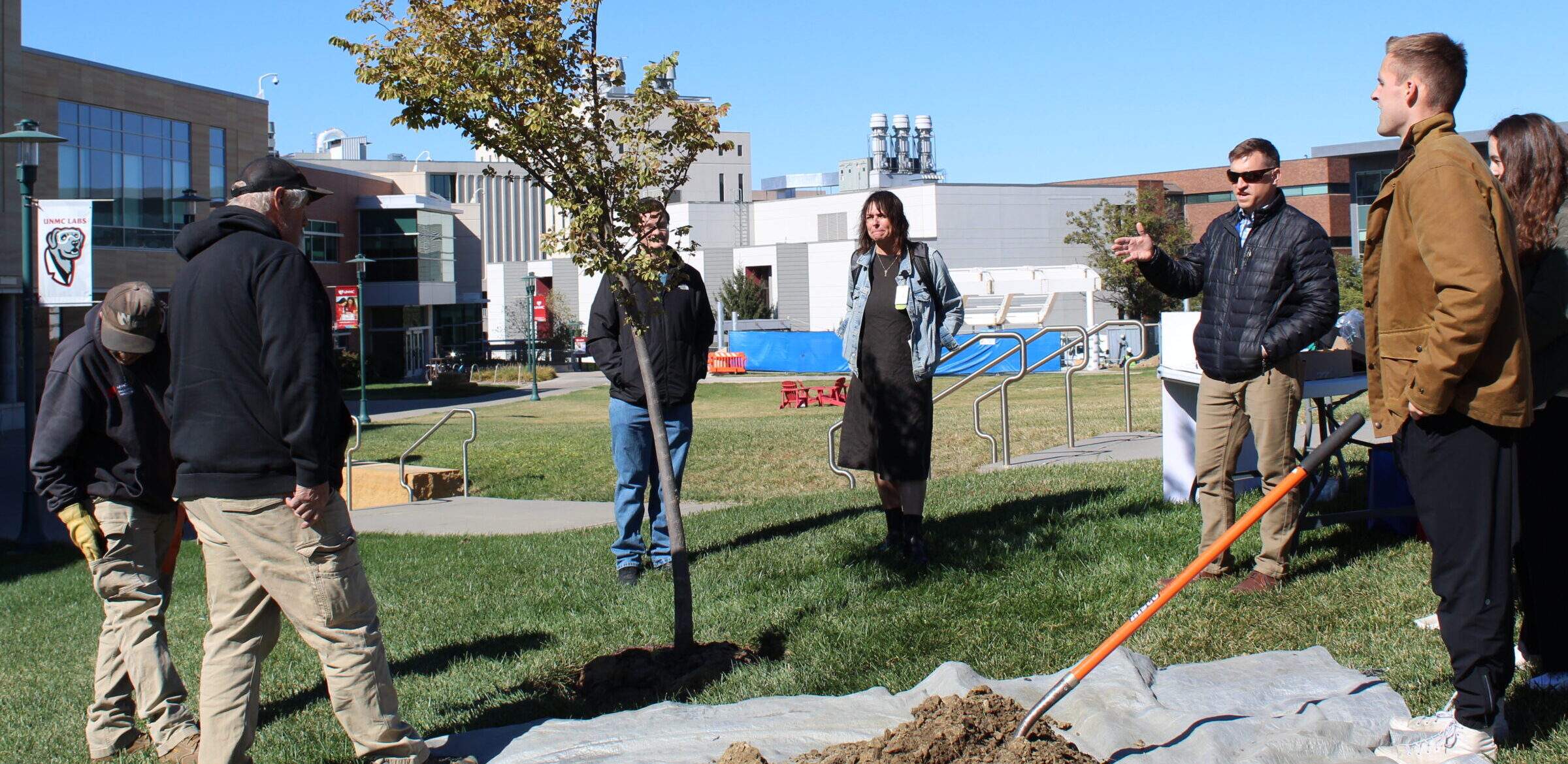
In October, the med center hosted several events to celebrate Campus Sustainability Month.
“No one of us can solve issues of sustainability on our own – it will take small and large efforts from everyone to make a difference,” said Eric Bloomquist, a member of the LiveGreen Ambassador Employee Resource Group and committee chair.
The ERG invites the med center community to join the group.
Bellevue Medical Center waste program
Bellevue Medical Center rolled out a new recycling program that will help reduce the amount of waste sent to the landfill. As part of the effort, 55 new slim recycling bins and 12 triple-bins were installed.
Sustainability Engagement Survey
The Sustainability Engagement Survey received almost 2,000 responses. Results of the survey will be announced shortly and will help improve campus sustainability efforts.
Health Care Culinary Contest
Culinary services joined the Health Care Culinary Contest, which challenged health care culinary professionals to create a delicious plant-based dish. The “Vibrant Veggie Power Bowl” was served in the Nebraska and Clarkson Cafés on Nov. 20.
LiveGreen Ambassador ERG retreat
The LiveGreen employee resource group held its first retreat on Oct. 18 at Hitchcock Nature Center. Grace McMinn, a LiveGreen ambassador, said, “Each member touches a different part of our community – a community that displays opportunities to better the campus’s ‘live-green mindset.’ I’m proud to be part of a group comprised of people who act like every day is Earth Day.”
Campus cleanup
In collaboration with the Blue Bucket Project, the UNMC Office of Sustainability and LiveGreen ambassadors collected litter on Oct. 10 from the area around the Davis Global Center. Participants collected two bags of landfill waste, half a bag of recycling and one bag of Hefty ReNew Bag materials. The office also participated in Terracycle’s Writing Instruments Recycling Program by shipping about 6,500 disposable writing instruments to be made into new recycled products.
Tree planting
On Oct. 15, the UNMC Office of Sustainability partnered with UNMC grounds to plant a Frontier elm. “Nimbus” is located in the green space north of the Lozier Center for Pharmacy Science.
As ‘Green Lab’ pilot winds up, Drs. Mirnics, Korade led the way
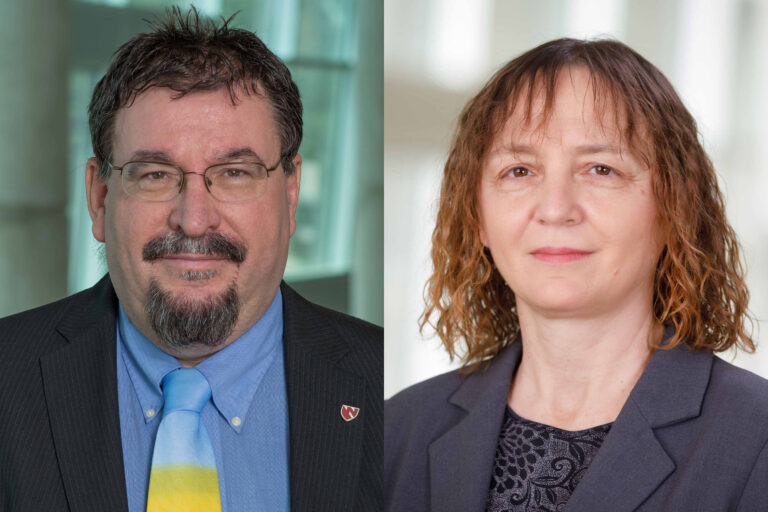
The laboratories of Karoly Mirnics, MD, PhD, director of the UNMC Munroe-Meyer Institute, and Zeljka Korade, DVM, PhD, professor of pediatrics at UNMC, led the way in UNMC’s initial pilot of a “Green Labs” program.
They achieved the highest certification level – green – by completing more than 80% of available credits in the program.
“We all have to do our part to preserve our amazing world for future generations,” Dr. Mirnics said. “It starts with each of us, locally, and not only as a global process.”
Since the pilot launched in May, the lab has led the way in completing the credits within the pilot and providing valuable feedback for program coordinators.
Dr. Mirnics said the lab leveraged the program as an opportunity to “review how we operate, become less wasteful and be more cognizant of how our work affects the environment.”
Allison Anderson, the lab’s Green Lab navigator:
- Completed the baseline and final scorecards for the lab, working with lab staff to provide updates and answer questions.
- Served as the main point of contact between the lab and the UNMC Office of Sustainability, identifying areas for improvement in the lab.
- Provided meaningful feedback and input throughout the design and development of the program, helping program developers to better understand the issues faced by participants and find solutions.
For more information about the Green Labs pilot, visit the program website.
Sustainability Engagement Survey seeks campus feedback

Every two years, the UNMC Office of Sustainability surveys the campus community to assess engagement in sustainability initiatives at the med center. All faculty, students and staff are encouraged to participate.
Click here to take the anonymous survey anytime between Oct. 28 and Nov. 8. It should take about seven to 10 minutes to complete. After finishing the survey, respondents will be directed to a separate survey page to enter into a drawing for one of eight $25 gift cards to local businesses.
The Sustainability Engagement Survey asks respondents to weigh in on five dimensions of sustainability engagement at the med center:
- Awareness of efforts to be more sustainable.
- Knowledge about ways to be sustainable.
- Behavioral frequency of sustainable behaviors.
- Perceived behavioral frequency of the sustainable behaviors of others.
- Familiarity with sustainability topics.
The survey will help the UNMC Office of Sustainability identify opportunities to raise awareness and develop impactful programs and campaigns by highlighting the organization’s sustainability strengths and areas for improvement.
The survey results also will allow us to measure progress toward the med center’s campus engagement score, which combines the five dimensions to determine a single score between 0-100.
Lisa Kinney, vice president of the LiveGreen Ambassador Employee Resource Group, said individual behavior change is important to help the med center reduce its environmental impact.
“It’s important for communities to come together to make sustainable changes and bring our planet back into balance,” she said. “There are adjustments you can make in your daily routine to use less water, reduce emissions and decrease single-use products that end up in landfills.
“Even more impactful is what you can implement on a grander scale at Nebraska Medicine and UNMC.”
Kinney and the ERG urge all campus community members to make their voices heard by taking the survey.
This year, the survey will overlap with Campus Sustainability Month, an international celebration of sustainability in higher education. To celebrate, consider attending any of the events and educational opportunities being held across campus.
With questions, contact the UNMC Office of Sustainability.
Events set to celebrate Campus Sustainability Month

Held every October, Campus Sustainability Month is a celebration of sustainability in higher education in which campuses across the world engage and inspire campus community members to become sustainability change agents.
To celebrate, the med center is hosting a series of events and educational opportunities.
In addition, details are forthcoming about this year’s Sustainability Engagement Survey, so watch for the survey launch and take time to fill it out. Results from the survey will help the med center monitor and improve its campus sustainability efforts.
Practice Greenhealth annual membership drive
To create a Practice Greenhealth account:
- Go to the Practice Greenhealth website and in the upper-right corner click “sign up” or login after creating an account.
- Use hospital/member code: 166757.
- Members can access the many resources on the website and register for and attend any of the events.
Tree planting ceremony: TBD, green space north of Lozier Center for Pharmacy Science
HEAL is partnering with UNMC grounds to host a tree planting ceremony. Help improve green spaces on campus while learning more about campus sustainability efforts. Attendees can submit ideas for naming the tree, or submit an idea here. The event is being rescheduled from its original date of Oct. 3, and details will be announced soon.
Campus cleanup: Oct. 10, noon-1 p.m., Sorrell Center for Health Science Education
Join in picking up trash around campus over lunchtime with the Blue Bucket Project. Volunteers will meet near the Healing stethoscope statue outside of the Sorrell Center. Register here and invite friends, coworkers and classmates.
LiveGreen Ambassador ERG retreat: Oct. 18, noon-5 p.m., Hitchcock Nature Center
The LiveGreen Ambassador ERG is holding its first retreat. Attendees must be members of the ERG, although anyone is welcome to become a member and attend. Join the LiveGreen Ambassador program here. Members will receive information on this event in their email.
Health care culinary contest: Oct. 1-Nov. 30, online
Eating a plant-based diet can not only be beneficial to human health, but also it can reduce the carbon footprint and mitigate climate change. Every year, Health Care Without Harm hosts a contest for health care culinary professionals to take their plant-based menus to a new level. As a new Practice Greenhealth member organization, the med center now is eligible to participate. Details about the med center’s first contribution will be forthcoming.
Take action in October by:
- Attending one of these events
- Signing up to be a LiveGreen Ambassador
- Sustainably commuting with the TravelSmart program
- Refamiliarizing yourself with the med center’s sustainability goals
- Inviting peers to do the same
Extreme heat has major health impacts

As energy curtailment season continues, LiveGreen offers information on heat-related concerns.
Last month, the UNMC College of Public Health’s Climate and Health Program hosted a webinar to inform health care providers of the impacts of extreme heat on human health for Nebraska communities.
Topics included how heat alerts are handled, current trends in heat-related illnesses, populations at higher risk and treatment of these illnesses. This webinar was timely, as the medical center is now in the energy curtailment season and has curtailed once this summer already.
Extreme heat: what is it?
In most of the United States, temperatures above 90°F can typically be described as extreme heat. Extreme heat is usually expressed with a measurement of the heat index, which accounts for humidity and air temperature. It also is consistently ranked as the deadliest type of extreme weather in the United States.
How does extreme heat impact human health, and how can we stay safe?
Extreme heat is not just an inconvenience. Rather, it has significant implications for human health and wellbeing. When the body is unable to cool itself, there is the danger of illnesses such as heat cramps, heat exhaustion or heat stroke. Some populations are at a greater risk of these illnesses, including the elderly, young children, those with mental illnesses or chronic diseases, outdoor workers and members of low-income communities.
According to Chris Dethlefs, MD, a resident in the UNMC Department of Internal Medicine, the most effective management strategy for a heat-related illness is to cool off the body as quickly as possible by submerging in an ice bath. To avoid serious health impacts, the goal is to lower the core body temperature to below 104°F in less than 30 minutes.
How does sustainability interact with heat and health?
Of the connection between sustainability efforts and patient outcomes in the face of extreme heat, Dr. Dethlefs said:
“As our communities face increasingly intense heat stress and its acute and chronic impacts on health, we at UNMC are well positioned to help build adaptive capacity in our city through direct patient care, anticipatory education and resource coordination.
“This begins in part with advancing sustainability measures within our own institution. Adaptability and sustainability are fundamentally intertwined in the face of environmental pressures such as extreme heat, and they will be essential qualities for UNMC to continue supporting the health of our communities in our changing climate. Many students, faculty, and staff are actively making strides towards this goal, thereby shaping the med center itself into a more resilient agent for change”.
To learn more about heat-related illnesses, who is most at risk, and how to prepare for the increasing prevalence of extreme heat events, you can read the booklet produced by the Center for Disease Control (CDC) and the Environmental Protection Agency (EPA).
For another resource on heat-related illness, including to read in more detail about how some people have more difficulty in extreme heat than others, members of the medical center community can check out Nebraska Medicine NOW’s article, “How does excessive heat affect the body?”.
LiveGreen Ambassadors becomes Employee Resource Group

Marking a new chapter in the med center’s sustainability journey, the LiveGreen Ambassador program has officially become an Employee Resource Group on campus.
The LiveGreen Ambassador ERG joins a range of other established groups that encourage people around the med center to find connection and community with others. The Employee Resource Groups are open to all UNMC and Nebraska Medicine faculty, staff and students.
Uniting employees and students with a shared vision of environmental stewardship, the new Employee Resource Group builds on the med center’s long-established LiveGreen Ambassador program supported by the UNMC Office of Sustainability.
Jerrod Bley, sustainability manager, said the shift represents an exciting new chapter for the LiveGreen Ambassadors.
“It really empowers our amazing volunteers at the medical center, helping them become a more organized and mission-driven force on campus,” Bley said. “Their passion for making meaningful, lasting and sustainable improvements within our organization will shine even brighter, making a bigger impact on our community and environment.”
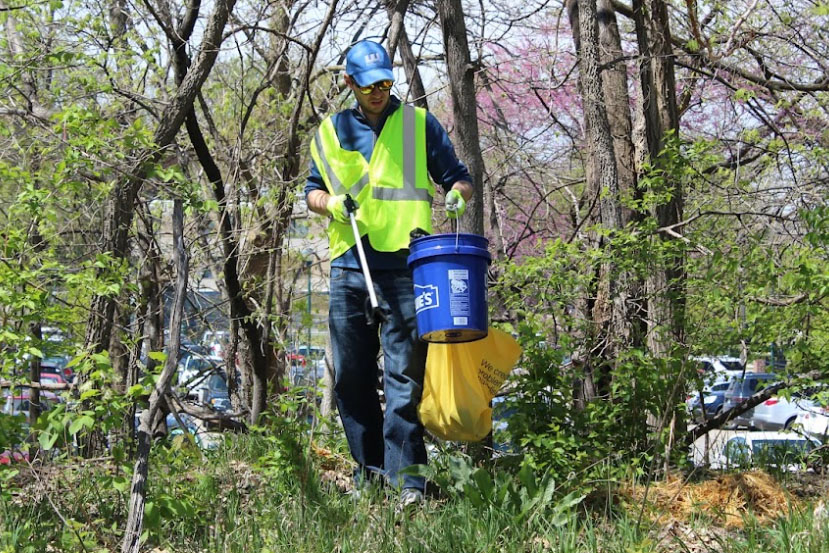
The group hopes to offer members opportunities to participate in meaningful sustainability initiatives, contribute to the med center’s sustainability goals and make a positive impact on the med center and the community. It also will support members as they continue to provide exceptional care, education and research at the med center.
The ERG’s president is Andrew Kirchner, a physician assistant in thoracic and cardiac surgery at the Heart and Vascular Center at Durham Outpatient Center.
Said Kirchner, “Combining the resources of Nebraska Medicine’s Department of Engagement, Outreach and Belonging with the mission of the LiveGreen Ambassadors will broaden our communication reach to increase awareness about both general sustainability on campus and specific initiatives. I hope to increase our pool of excited, dedicated members to conceive, contribute to and execute sustainability projects on campus.”
To learn more about the LiveGreen Ambassador program, visit the LiveGreen Ambassadors webpage. Click this link to join the LiveGreen Ambassadors Employee Resource Group.
Med center will practice energy curtailment in summer heat
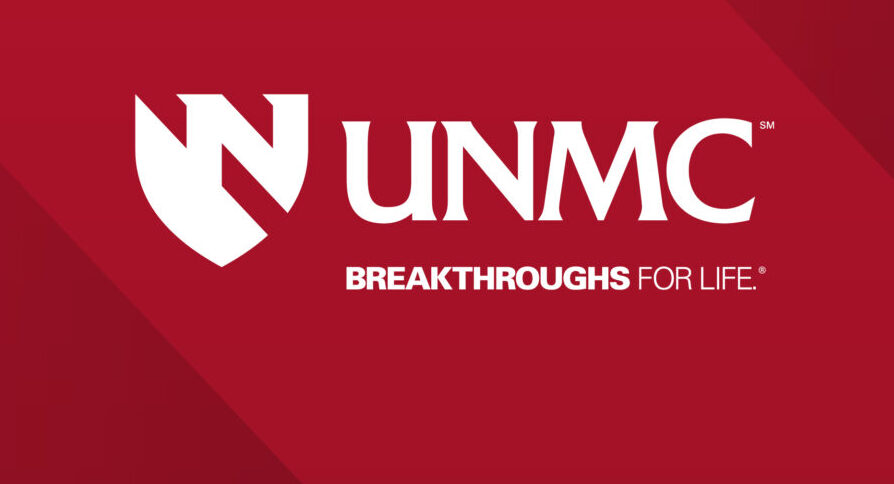
As temperatures rise this summer, the med center again will be implementing energy curtailment days to ensure the efficient operation of critical systems.
Energy curtailment is a practice designed to reduce energy consumption during periods when energy systems are under significant strain, such as times of extreme heat or humidity. Patient care and research spaces are not affected by energy curtailment.
During curtailment, the med center community is asked to reduce their energy usage by:
- Closing shades, blinds and curtains to reduce solar heat gain.
- Closing neighbors’ window coverings and turning off their lights and equipment if they aren’t on campus.
- Lowering light levels and turning off lights in unoccupied areas.
- Turning off and unplugging unused electrical equipment, such as computers, coffee makers, printers and chargers. Equipment is recommended to be charged after 7 p.m.
- Shutting fume hood sashes when not in use (“Shut the Sash!”).
- Considering working remotely on curtailment days. Coordinate with the appropriate manager.
- Opening doors manually instead of using accessibility buttons.
- Using stairs instead of an elevator if possible.
- Reminding others to make these changes.
To report spaces colder than 66 degrees or warmer than 78 degrees, call 2-3347 (Nebraska Medicine) or 9-4050 (UNMC).
Taking part in curtailment days is crucial for the med center because it:
- Ensures continuity of essential hospital and research systems.
- Reduces pollution by lowering greenhouse gas emissions.
- Decreases utility costs.
- Supports the med center’s Net Zero sustainability goals by reducing energy consumption and promoting sustainable practices.
Colleagues also can participate in the UNMC Office of Sustainability’s Energy Conservation EcoChallenge to track conversation efforts and enter for a chance to win a gift card to a local sustainability business.
To learn more about energy curtailment at the med center, visit the LiveGreen guidance web page.
Med center makes an impact during Earth Month
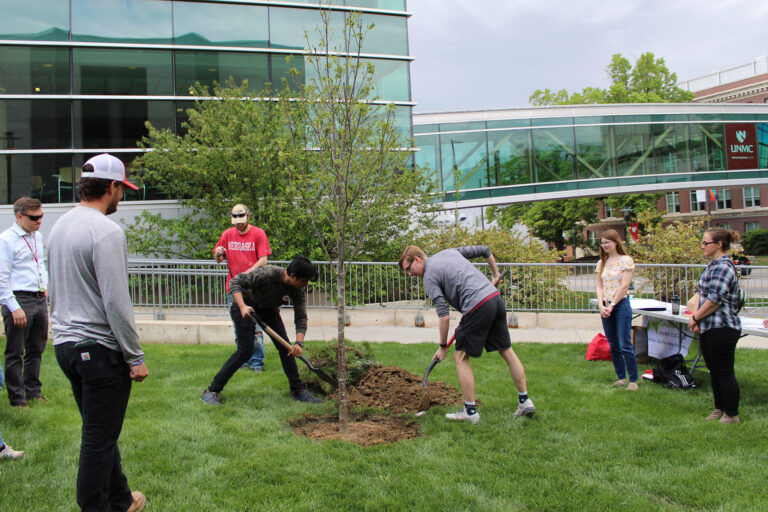
To celebrate Earth Month, the med center hosted events and opportunities to promote sustainability throughout the month of April and the beginning of May.
On April 9, the UNMC Office of Sustainability hosted a webinar about urban pollinator habitats and their impact on human health. The speakers were Benjamin Vogt, owner of the prairie-inspired design firm Monarch Gardens, and Bob Gittins, president and founder of Nebraska Monarchs.
At the LiveGreen Ambassador kick-off event, faculty and staff celebrated the program becoming an Employee Resource Group on campus. To learn about the program and its impact on campus climate efforts, visit the LiveGreen website.
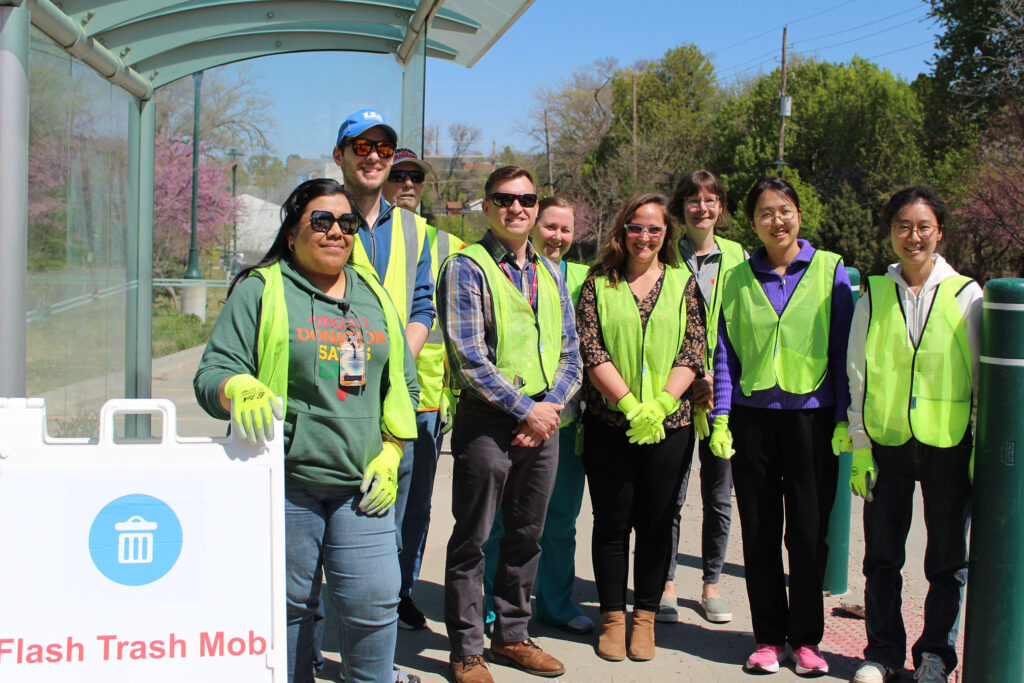
In collaboration with the Blue Bucket Project, the UNMC Office of Sustainability hosted a “Flash Trash Mob” on April 24 to collect litter from the native prairie area surrounding Parking Lot 64. Participants collected two full bags of landfill waste, one of recycling and one of Hefty Renew Bag materials.
At the Arbor Day tree planting event, students and staff planted a Japanese Lilac tree named “Kibo,” which means “hope” or “aspiration” in Japanese. It is located near Williams Science Hall in the Ruth and Bill Scott Student Plaza.
Also at the Arbor Day event, attendees heard from the Healthy Earth Alliance student group about the med center’s 2023-2024 Planetary Health Report Card. That worldwide initiative supports students at health professional schools to celebrate their institution’s environmental successes and identify opportunities for improvement.
Review the med center’s summary report and see the scores here.
The annual personal electronic waste and techno trash shredding event on May 7 and 8 collected $782 and 290 food items to be donated to the food pantry.
Materials diverted from the landfill were:
- 3,969 pounds of electronic waste
- 2,850 pounds of personal documents
- 86 pairs of glasses
- 64 pounds of assorted media
- Nine pounds of pop tabs
- 135 pounds of alkaline batteries
- 30 pounds of rechargeable/button batteries
Throughout April, the UNMC Office of Sustainability hosted the One Healthcare EcoChallenge, an online platform that encourages participants to weave sustainable actions into their daily lives. The participants saved 456 gallons of water, 700 pounds of carbon dioxide and traveled 138 miles without driving a car. Lindsay Bruce was randomly chosen as the winner of the med center’s challenge.
Also in April, the office of sustainability hosted an online photo contest to showcase how participants engage with nature. Congratulations to winner Stephanie Le.
To participate in sustainability initiatives and activities year-round, contact Jerrod Bley at the UNMC Office of Sustainability.
Green Labs initiative to promote sustainable research

UNMC and the med center campus in Omaha is a world-class research facility, with more than 740,000 square feet of dedicated research space, making it a world leader in health research.
Lab spaces are resource intensive. In comparison with standard office spaces, laboratories use five- to 10-times more energy and five-times more water. Laboratory researchers generate around 15-times more plastic waste than the average individual, with labs being responsible for a total of 5.5 million tons of plastic waste per year.
The med center’s Green Labs Program complements the med center’s institutional sustainability goals, as well as the University of Nebraska System’s 2023 sustainability plan.
The UNMC Office of Sustainability is collaborating with the UNMC Office of the Vice Chancellor for Research to drive optimization in energy and water consumption, while exploring innovative and practical ways to manage waste downstream and upstream by working with procurement to offer more sustainable options for researchers.
The voluntary program is designed to support lab personnel who are interested in implementing measures and adopting behaviors that will reduce environmental impacts without sacrificing research quality, safety standards or lab productivity.
Participants will be asked to fill out an initial survey to establish a baseline and a post-pilot questionnaire seeking feedback on the process and resources. If a UNMC lab is interested in joining the Green Labs program, consider signing up for the pilot. Click here to fill out the interest form for the lab, and the UNMC Office of Sustainability will be in contact to get the process started.
Before submitting the form, consider discussing the program with lab personnel to approve participation and determine who will serve as the lab’s representative throughout the pilot.
To kick start the Green Labs pilot program, the med center is participating in the International Freezer Challenge. This free competition offers guidance and resources to optimize a lab’s cold storage for better sample access and improved sample integrity, while reducing energy usage.
Enrollment in the Green Labs program is not required to participate, but colleagues who are interested can fill out the same interest form to start receiving information about the challenge.
For more information, including viewing the Green Labs program structure and program goals, visit the LiveGreen web pages for the Green Labs Program and the Freezer Challenge.
Earth Month will showcase nature and biodiversity
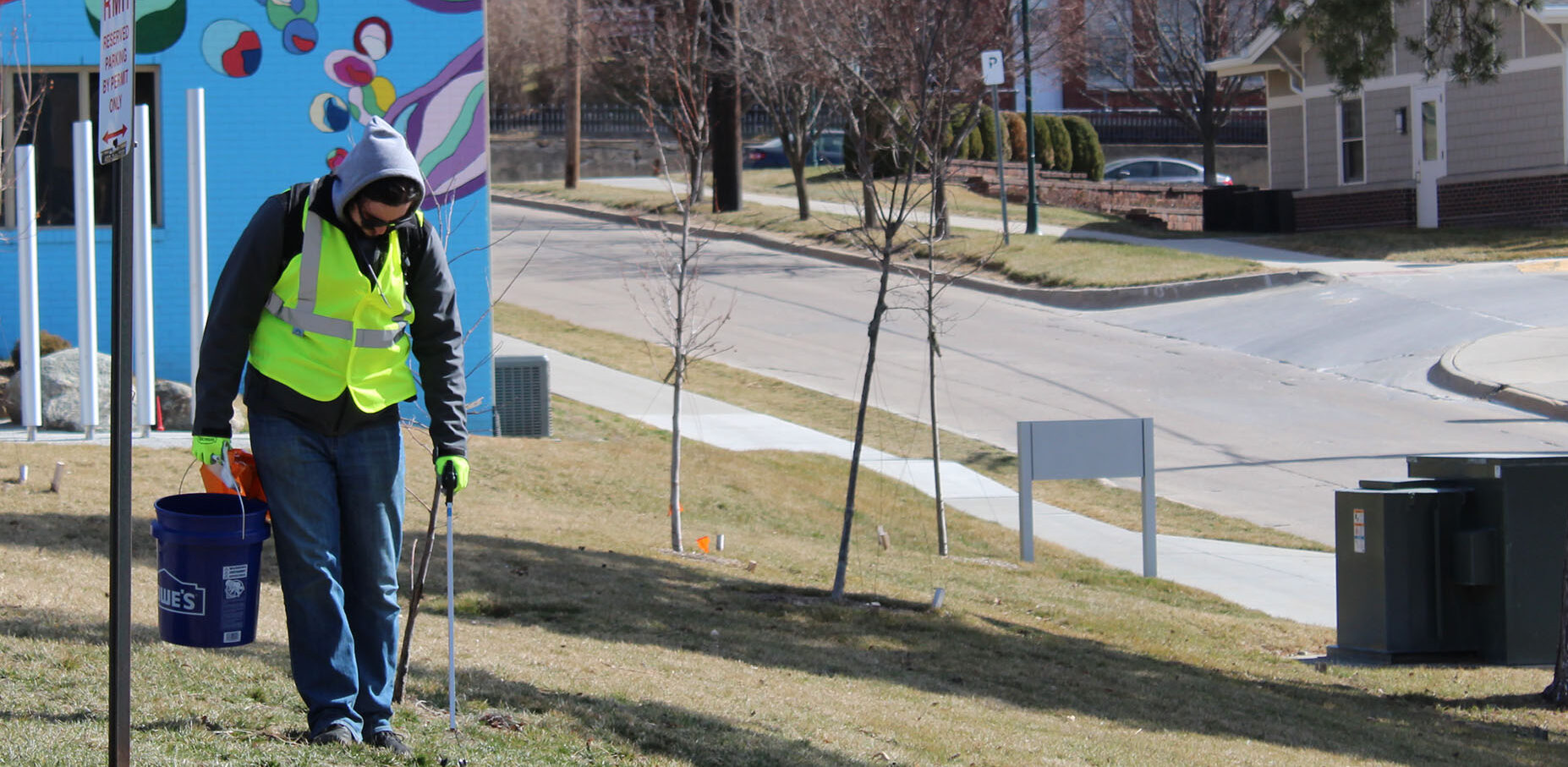
April 22 is Earth Day, and the med center will celebrate Earth Month throughout April, focusing on nature and biodiversity. The events offer opportunities to learn more about how the med center improves the community’s biodiversity and what the med center is doing to maintain a natural environment.
Check out this event list to learn how to participate in the Earth Month celebrations and engage with nature.
Nature photo contest: All month, online
The UNMC Office of Sustainability is hosting a photo contest. Entrants can share how they interact with nature on or off campus during April for the chance to win a gift card to a local business or an upcycled lab coat tote bag.
Health Care Ecochallenge: All month, online
Join the Health Care EcoChallenge, where you can take sustainable action directly related to health care and health topics. Click here to join the med center team and earn points. Top-scoring participants will be recognized and receive a local gift card or a lab coat tote bag at the end of the month.
Campus cleanup: April 24, noon-1 p.m., Lot 64 (native prairie area)
Note: Due to the possibility of severe weather, the date of the event has been changed from April 16 to April 24. Join in picking up trash around campus over lunch time with the Blue Bucket Project. A group will be cleaning up at Lot 64 around the native prairie, making sure the prairie is clean while also learning more about its benefits and other engagement opportunities. Register here and invite friends, coworkers and classmates.
Arbor Day tree planting ceremony: Wednesday, May 1, noon-1 p.m., at the far west end of the Ruth & Bill Scott Student Plaza between the Sorrell Center and Williams Science Hall.
Note: Due to the weather, the date of the event has been changed to May 1. Join the UNMC Office of Sustainability, HEAL, and UNMC Student Senate in the biannual tree planting event for the planting of a Japanese lilac tree. Help improve green spaces on campus while learning more about the med center’s planetary report card. Stickers, snacks, seeds and saplings will be available, and participants will have the chance to name the tree being planted.
Webinar, ‘Urban Pollinator Habitat: Supporting Health & Wellness’: April 9, noon-1 p.m., virtual
The UNMC Office of Sustainability will host an online webinar to teach about urban pollinator habitats and their impact on health. The two guest speakers will be Benjamin Vogt, owner of the prairie-inspired design firm Monarch Gardens, and Bob Gittins, president and founder of Nebraska Monarchs.
LiveGreen ambassador kick-off: April 19th, 12-1 p.m., virtual
LiveGreen Ambassador Program has officially become an Employee Resource Group at the med center. Join the group on April 19 to begin planning what the LiveGreen Ambassador Program will look like this year. The program is an excellent opportunity for faculty and staff to create climate action on campus. To learn more about previous efforts by LiveGreen Ambassadors, go to the LiveGreen website.
Personal electronic waste and techno trash shredding event: May 7, 10 a.m.-6 p.m., and May 8, 6 a.m.-2 p.m., UNMC grounds building
Earth Month events will extend into May with the med center’s annual recycling event. Bring e-waste and old media to be recycled. Seedlings and wildflower seed packets will be available, courtesy of the Papio-Missouri River Natural Resources District. Details are available on the website. If interested in volunteering at the event, click here.
